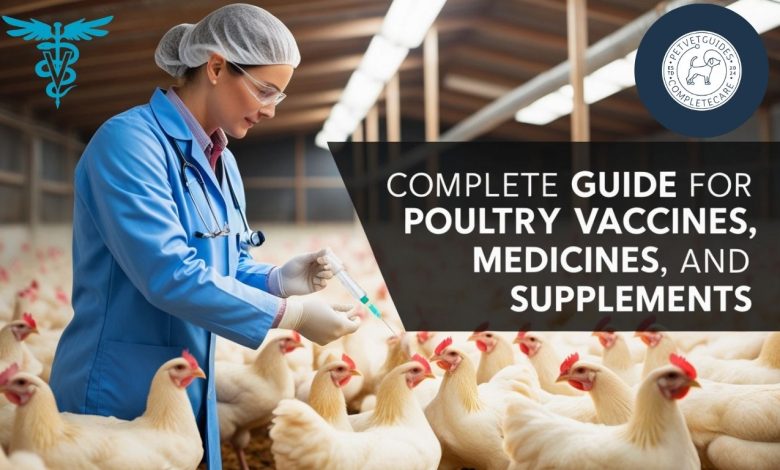Complete Guide for Best Poultry Medicines, Vaccines, and Supplements

Vaccination is a vital aspect of poultry management, protecting chickens and ducks from various infectious diseases. Proper vaccination protocols enhance flock health, improve productivity, and prevent the spread of diseases. Understanding the types of Poultry Medicines, vaccines, appropriate administration ages, and the diseases they prevent is essential for effective poultry farming.
Table of Contents
Types of Poultry Vaccines
1.Marek’s Disease Vaccine
- Age for Administration: Administered on the day of hatching.
- Symptoms Indicating Need: Tumors, paralysis, weight loss.
- Disease Prevented: Marek’s disease, a viral infection causing tumors and paralysis.
- Administration Area: Subcutaneous injection, typically in the neck.
- Post-Vaccine Reactions: Mild swelling at the injection site.
- Cost: Varies from BDT 5 to BDT 10 per dose.
2.Newcastle Disease Vaccine
- Age for Administration: First dose at 1 day old, with boosters at 2-4 weeks and every 3 months.
- Symptoms Indicating Need: Respiratory distress, nervous signs, drop in egg production.
- Disease Prevented: Newcastle disease, a highly contagious viral infection.
- Administration Area: Intranasal or ocular route.
- Post-Vaccine Reactions: Mild respiratory signs, reduced appetite.
- Cost: Varies from BDT 3 to BDT 8 per dose.
3.Infectious Bronchitis Vaccine
- Age for Administration: First dose at 1-3 weeks, with boosters every 3 months.
- Symptoms Indicating Need: Coughing, sneezing, nasal discharge.
- Disease Prevented: Infectious bronchitis, a respiratory disease affecting chickens.
- Administration Area: Aerosol or drinking water.
- Post-Vaccine Reactions: Mild respiratory signs.
- Cost: Varies from BDT 4 to BDT 10 per dose.
4. Fowl Pox Vaccine
- Age for Administration: First dose at 6-10 weeks.
- Symptoms Indicating Need: Lesions on comb, wattles, and unfeathered skin.
- Disease Prevented: Fowl pox, a viral disease causing skin lesions and diphtheritic lesions.
- Administration Area: Wing web stab method.
- Post-Vaccine Reactions: Swelling at the injection site.
- Cost: Varies from BDT 5 to BDT 12 per dose.
5. Duck Viral Hepatitis Vaccine
- Age for Administration: First dose at 1 day old.
- Symptoms Indicating Need: Sudden death, lethargy, convulsions.
- Disease Prevented: Duck viral hepatitis, a highly contagious viral disease.
- Administration Area: Intramuscular or subcutaneous injection.
- Post-Vaccine Reactions: Mild fever, reduced activity.
- Cost: Varies from BDT 5 to BDT 15 per dose.
Free Vaccine: Apply Now
Poultry Medicines for Diseases
1. Coccidiosis
- Symptoms: Diarrhea, weight loss, reduced feed intake.
- Medicine: Amprolium, Toltrazuril.
- Administration: Added to drinking water.
- Cost: Approximately BDT 50 to BDT 100 per bird.
2. Infectious Bursal Disease (IBD)
- Symptoms: Diarrhea, depression, ruffled feathers.
- Medicine: Hyperimmune serum, supportive care.
- Administration: Injection.
- Cost: Approximately BDT 100 to BDT 200 per bird. Antibiotics for Poultry
3. Tetracycline
- Usage: Treats respiratory and intestinal infections.
- Administration: Added to drinking water or feed.
- Cost: Approximately BDT 50 to BDT 100 per bird.
4. Enrofloxacin
- Usage: Broad-spectrum antibiotic for bacterial infections.
- Administration: Added to drinking water.
- Cost: Approximately BDT 100 to BDT 150 per bird.
Probiotics for Poultry
1. Lactobacillus
- Usage: Promotes gut health and improves digestion.
- Administration: Added to drinking water or feed.
- Cost: Approximately BDT 20 to BDT 50 per bird.
2. Bacillus Subtilis
- Usage: Enhances nutrient absorption and boosts immunity.
- Administration: Added to drinking water or feed.
- Cost: Approximately BDT 30 to BDT 60 per bird.
Vitamins for Poultry
1. Vitamin A
- Usage: Supports vision, growth, and immune function.
- Administration: Added to drinking water or feed.
- Cost: Approximately BDT 10 to BDT 20 per bird.
2. Vitamin D3
- Usage: Essential for calcium absorption and bone health.
- Administration: Added to drinking water or feed.
- Cost: Approximately BDT 10 to BDT 20 per bird.
Website: Click Now
Conclusion
Proper Poultry Medicines, vaccination, and supplementation protocols are crucial for maintaining the health and productivity of poultry. By understanding the specific needs of chickens and ducks and providing appropriate Poultry Medicines, care, farmers can ensure a healthy and profitable flock. For more detailed information on poultry healthcare, visit Pet Vet Guides.


